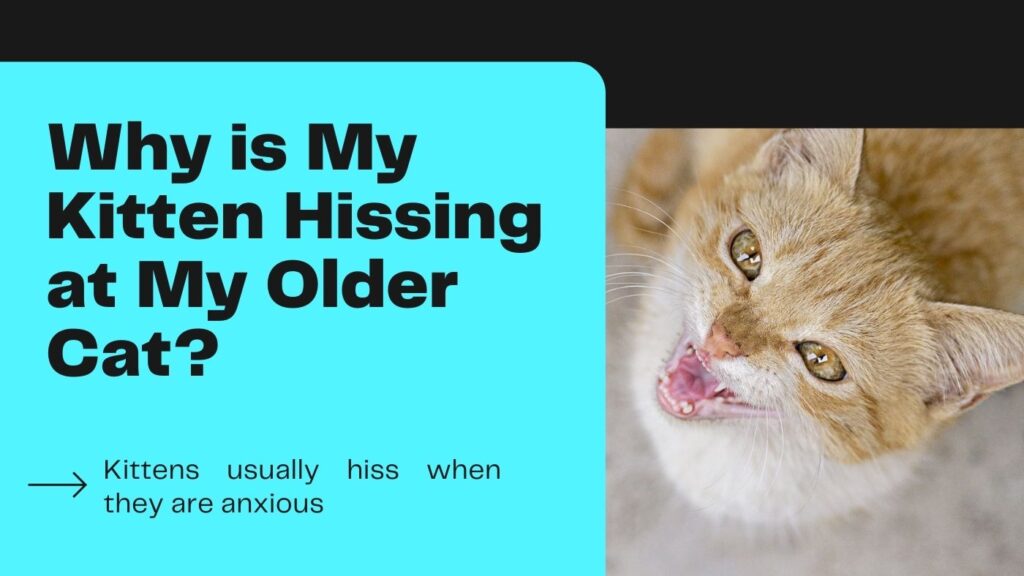If you’ve recently acquired a new kitten, you may be wondering how to introduce it to your older cat properly. In some cases, your new kitten may begin hissing at your older cat, and there are a variety of reasons for this. In this article, we’ll explain why your new kitten is hissing at your older cat, and offer advice on introducing them to one another
Why is My Kitten Hissing at My Older Cat?
Kittens usually hiss at older cats when they feel anxious or threatened. Luckily, kittens usually stop hissing when they get acclimated to their new environment.
First impressions are just as crucial between pets as they are between people. You should prepare your older cat for this massive transition, especially if they have grown up alone. It is possible that your older cat may struggle to adjust to living with a kitten. If your older cat is calmer and not reacting to your new kitten’s hissing, you are incredibly fortunate. However, older cats can begin hissing at new kittens as well.
Hissing is a commonly misunderstood behavior in cats. Hissing, contrary to popular belief, does not always mean your cat wants to attack or fight. While humans can communicate using speech, cats must frequently rely on body language and other sounds to convey their emotions. Hissing in cats can mean they are scared, anxious, territorial, or even confused.
New kittens frequently hiss because they are afraid. Their entire life has been changed forever. It has been separated from its littermates, its mother, and the people it has known – and is now surrounded by strangers, new older cats, and unfamiliar smells. This is why kittens sometimes cry when you pick them up.
Cats prefer familiar objects because they make them feel protected. Therefore, your kitten might be hissing because they don’t recognize their new environment. If your new kitten hisses at your older cat, it could be expressing insecurity in the situation and attempting to avoid a physical confrontation.
Cats have a fight or flight instinct, and they sometimes hiss before fleeing. When a cat feels threatened, it may show off its teeth by hissing to appear stronger.
What to do if your kitten is hissing at your older cat?
If your new kitten begins hissing at your older cat, it is best to give it some space. Do not try to hold or comfort it, as this may cause it to become even more stressed. You should give it some time to calm down, which could take several hours or even days.
Allow it to hide instead of staring at it to feel safe in the household. It’s best to separate your new kitten from your older cat first.
Familiarizing scents
For a few days, keep your new kitten in a separate room until it gets used to the scent of your older cat. You can also switch their beddings to get a better sense of each other’s scent and be more comfortable. While the cats are separated, you should also encourage positive interactions.
You can accomplish this by placing treats near the door that separates them. You should not punish your new kitten (or your older cat) for hissing because this can negatively affect the relationship between the other cat and you.
Bringing them together
After a couple of days of no hissing, you can let the cats see each other to become familiar with each other’s scents. You may notice some hissing and light swatting when they see each other. This is normal, so don’t be alarmed. If the hissing does not cease after 1 or 2 minutes, separate them and try again when relaxed. You should not introduce them if one of the cats is in heat.
Do not force them to become friends right away; everything will happen in its own time. To help introduce them, you can prepare treats to ensure that they have a pleasant interaction with one another. Gradually extend the time your cats spend together until they can spend at least five hours without any incidents. You should also give hiding places for your cat to go to when it is stressed, so it may relax and be alone. This can be accomplished by making an igloo, acquiring a cat tree, or arranging a high enough space.
I also suggest that you have the cats use separate litter boxes at first. This is because your older cat might become territorial of their litter box, and this can lead to acts of aggression or intimidation.
Conclusion
Every cat is unique. Some cats adjust to the introduction within hours, while others may take several days or even weeks. This article should have shed some light on why your new kitten is hissing at your older cat. It is critical to not rush the process and instead let everything unfold naturally. I am confident that once your new kitten and older cat are accustomed to each other’s scents and presence, your cats will be the best of friends who spend their entire lives snuggling in peace.

